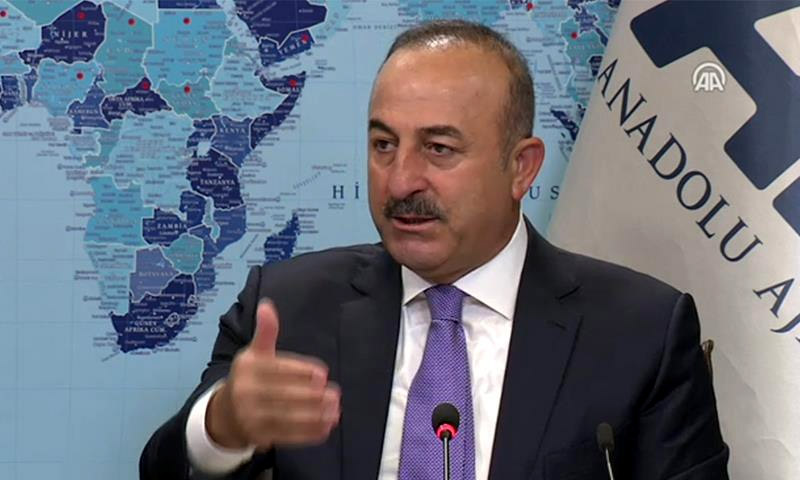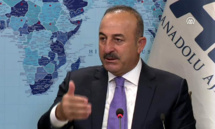"Of course, if the war starts again in Syria, more refugees will be received in Turkey and more pressure will be on Europe," he added.
The work with Russia on Syria was taking place despite serious differences Cavusoglu said. Moscow is a staunch backer of Syrian President Bashar al-Assad, while Turkey backs the opposition.
"For us, Assad cannot unite Syria. For us, such a regime should not stay even for the transition. This is our position. He should step down."
Turkey, a NATO ally, was also moving closer to Russia by recently signing a deal to buy the S-400 advanced air defence system, which is reportedly worth 2.5 billion dollars. The first units are to be delivered in 2020. The US has voiced concern.
"We need an air defence system. I needed it urgently. We wanted to buy from our NATO allies, but it did not work out," he said, citing a range of problems.
"Russia gave me the best deal. And that is why I bought it from Russia," he added.
There was still no agreement on technology transfers, what has been a long-standing Turkish demand in recent years as it shopped around for a system to purchase.
"They told us, in principle, that there will be joint production and also technology transfer. But this is an issue to negotiate in the medium-term and long-term."
The deal is one of a number of pressure points in Turkey's relationship with Washington. Just before the New Year, the sides agreed to end a three-month dispute which saw them drastically limit the issuance of visas to each other's citizens.
"We are not moving away and we don’t want to move away" from the relationship with the US, Cavusoglu said.
"I am convinced that President Trump understands the importance of Turkey for the region and also for the US. And he also respects Turkey and President [Recep Tayyip] Erdogan," the foreign minister insisted.
He was reluctant to directly criticize Donald Trump for the US decision to arm the Syrian-Kurdish YPG, a militia fighting the Islamic State extremist group. Turkey sees the YPG as a terrorist organization.
"President Trump was against giving weapons to YPG. The problem is the State Department is saying one thing, the Pentagon something else. The vision between the different departments in the United States, this is the problem," he said.
On Trump's decision to recognize Jerusalem as Israel's capital, he was more forceful: "We are very much disappointed with Trump about al-Quds, Jerusalem. This is a very big mistake." The US should reverse policy, he said. "Otherwise there will be chaos."
He said he was upset about US threats to cut aid to countries that criticized it about the decision to recognize Jerusalem as the capital of Israel and warned against the US ignoring the recent UN General Assembly resolution on the city.
"If the UN loses ground and its reputation, I think it will also undermine the role of the United States."
With regards to the ongoing conflict inside Turkey with the armed Kurdistan Workers' Party (PKK), which Ankara and the EU dub a terrorist group, Cavusoglu insisted that the group disarmed.
"They didn’t lay down their weapons, despite all the goodwill and positive steps coming from the state," he said about the last attempt to hold peace talks. "This time they have to lay down their weapons first."
"We have no agenda to restart negotiations with a terrorist organization that continues to murder Turkish citizens," press advisor Kahraman Haliscelik later told dpa.
Even in the absence of a peace process, he does not believe there should be problems with Kurdish citizens.
"I don’t have to promise anything to our Kurdish citizens. They are first class citizens. They enjoy full rights. We granted them all their rights, any rights that they needed," he said, citing in particular development projects in Kurdish cities.
The Kurdish minority in Turkey, which makes up about 15 per cent of the population, often cites language rights and cultural issues among their grievances.
-------------------------------------------------------------------------------------------------------------
The work with Russia on Syria was taking place despite serious differences Cavusoglu said. Moscow is a staunch backer of Syrian President Bashar al-Assad, while Turkey backs the opposition.
"For us, Assad cannot unite Syria. For us, such a regime should not stay even for the transition. This is our position. He should step down."
Turkey, a NATO ally, was also moving closer to Russia by recently signing a deal to buy the S-400 advanced air defence system, which is reportedly worth 2.5 billion dollars. The first units are to be delivered in 2020. The US has voiced concern.
"We need an air defence system. I needed it urgently. We wanted to buy from our NATO allies, but it did not work out," he said, citing a range of problems.
"Russia gave me the best deal. And that is why I bought it from Russia," he added.
There was still no agreement on technology transfers, what has been a long-standing Turkish demand in recent years as it shopped around for a system to purchase.
"They told us, in principle, that there will be joint production and also technology transfer. But this is an issue to negotiate in the medium-term and long-term."
The deal is one of a number of pressure points in Turkey's relationship with Washington. Just before the New Year, the sides agreed to end a three-month dispute which saw them drastically limit the issuance of visas to each other's citizens.
"We are not moving away and we don’t want to move away" from the relationship with the US, Cavusoglu said.
"I am convinced that President Trump understands the importance of Turkey for the region and also for the US. And he also respects Turkey and President [Recep Tayyip] Erdogan," the foreign minister insisted.
He was reluctant to directly criticize Donald Trump for the US decision to arm the Syrian-Kurdish YPG, a militia fighting the Islamic State extremist group. Turkey sees the YPG as a terrorist organization.
"President Trump was against giving weapons to YPG. The problem is the State Department is saying one thing, the Pentagon something else. The vision between the different departments in the United States, this is the problem," he said.
On Trump's decision to recognize Jerusalem as Israel's capital, he was more forceful: "We are very much disappointed with Trump about al-Quds, Jerusalem. This is a very big mistake." The US should reverse policy, he said. "Otherwise there will be chaos."
He said he was upset about US threats to cut aid to countries that criticized it about the decision to recognize Jerusalem as the capital of Israel and warned against the US ignoring the recent UN General Assembly resolution on the city.
"If the UN loses ground and its reputation, I think it will also undermine the role of the United States."
With regards to the ongoing conflict inside Turkey with the armed Kurdistan Workers' Party (PKK), which Ankara and the EU dub a terrorist group, Cavusoglu insisted that the group disarmed.
"They didn’t lay down their weapons, despite all the goodwill and positive steps coming from the state," he said about the last attempt to hold peace talks. "This time they have to lay down their weapons first."
"We have no agenda to restart negotiations with a terrorist organization that continues to murder Turkish citizens," press advisor Kahraman Haliscelik later told dpa.
Even in the absence of a peace process, he does not believe there should be problems with Kurdish citizens.
"I don’t have to promise anything to our Kurdish citizens. They are first class citizens. They enjoy full rights. We granted them all their rights, any rights that they needed," he said, citing in particular development projects in Kurdish cities.
The Kurdish minority in Turkey, which makes up about 15 per cent of the population, often cites language rights and cultural issues among their grievances.
-------------------------------------------------------------------------------------------------------------









 Home
Home Politics
Politics











